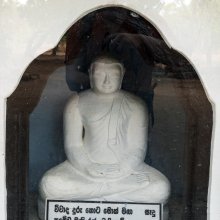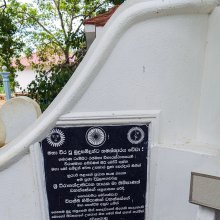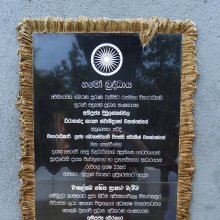Manga, Māṅga, Maṅga, Mamga: 16 definitions
Introduction:
Manga means something in Hinduism, Sanskrit, Marathi, Jainism, Prakrit, biology. If you want to know the exact meaning, history, etymology or English translation of this term then check out the descriptions on this page. Add your comment or reference to a book if you want to contribute to this summary article.
Images (photo gallery)
In Hinduism
Purana and Itihasa (epic history)
Source: JatLand: List of Mahabharata people and placesMaṅga (मङ्ग) is a name mentioned in the Mahābhārata (cf. VI.10.59) and represents one of the many proper names used for people and places. Note: The Mahābhārata (mentioning Maṅga) is a Sanskrit epic poem consisting of 100,000 ślokas (metrical verses) and is over 2000 years old.

The Purana (पुराण, purāṇas) refers to Sanskrit literature preserving ancient India’s vast cultural history, including historical legends, religious ceremonies, various arts and sciences. The eighteen mahapuranas total over 400,000 shlokas (metrical couplets) and date to at least several centuries BCE.
Biology (plants and animals)
Source: Wisdom Library: Local Names of Plants and DrugsManga [माणगा] in the Marathi language is the name of a plant identified with Bambusa bambos (L.) Voss from the Poaceae (Grass) family having the following synonyms: Arundo bambos, Bambos arundinacea, Bambusa arundinacea. For the possible medicinal usage of manga, you can check this page for potential sources and references, although be aware that any some or none of the side-effects may not be mentioned here, wether they be harmful or beneficial to health.
Source: Google Books: CRC World Dictionary (Regional names)1) Manga in India is the name of a plant defined with Catunaregam spinosa in various botanical sources. This page contains potential references in Ayurveda, modern medicine, and other folk traditions or local practices It has the synonym Randia dumetorum Lam. (among others).
2) Manga in Kenya is also identified with Lannea alata It has the synonym Odina alata Engl..
Example references for further research on medicinal uses or toxicity (see latin names for full list):
· Taxon (1978)
· Bulletin of the Botanical Survey of India (1983)
· Die Natürlichen Pflanzenfamilien (1897)
· Journal of Botany, British and Foreign (1911)
· Fl. Ned. Ind., Eerste Bijv.: (1861)
· Sylva Telluriana (1838)
If you are looking for specific details regarding Manga, for example extract dosage, health benefits, chemical composition, pregnancy safety, diet and recipes, side effects, have a look at these references.

This sections includes definitions from the five kingdoms of living things: Animals, Plants, Fungi, Protists and Monera. It will include both the official binomial nomenclature (scientific names usually in Latin) as well as regional spellings and variants.
Languages of India and abroad
Marathi-English dictionary
Source: DDSA: The Molesworth Marathi and English Dictionarymāṅga (मांग).—m (mātaṅga S) A low race or an individual of it. They are employed as executioners &c. aṅgānta māṅga śiraṇēṃ or yēṇēṃ g. of o. To fly into a rage.
Source: DDSA: The Aryabhusan school dictionary, Marathi-Englishmāṅga (मांग).—m A race held to be low or an individual of it.
Marathi is an Indo-European language having over 70 million native speakers people in (predominantly) Maharashtra India. Marathi, like many other Indo-Aryan languages, evolved from early forms of Prakrit, which itself is a subset of Sanskrit, one of the most ancient languages of the world.
Sanskrit dictionary
Source: DDSA: The practical Sanskrit-English dictionaryMaṅga (मङ्ग).—
1) The head of a boat.
2) The side of a ship.
Derivable forms: maṅgaḥ (मङ्गः).
Source: Cologne Digital Sanskrit Dictionaries: Shabda-Sagara Sanskrit-English DictionaryMaṅga (मङ्ग).—m.
(-ṅgaḥ) The head of a boat. E. magi to go, aff. ac .
Source: Cologne Digital Sanskrit Dictionaries: Benfey Sanskrit-English DictionaryMaṅga (मङ्ग).—m. The head of a boat.
Source: Cologne Digital Sanskrit Dictionaries: Cappeller Sanskrit-English DictionaryMaṅga (मङ्ग).—[masculine] [plural] [Name] of a people.
Source: Cologne Digital Sanskrit Dictionaries: Monier-Williams Sanskrit-English Dictionary1) Maṅga (मङ्ग):—mn. the head of a boat, [cf. Lexicographers, esp. such as amarasiṃha, halāyudha, hemacandra, etc.]
2) a mast or side of a ship, [cf. Lexicographers, esp. such as amarasiṃha, halāyudha, hemacandra, etc.] (cf. maṇḍa)
3) Name of a country in Śāka-dvīpa inhabited chiefly by Brāhmans, [Mahābhārata vi, 436] ([Bombay edition]; cf. maga and mṛga).
Source: Cologne Digital Sanskrit Dictionaries: Yates Sanskrit-English DictionaryMaṅga (मङ्ग):—(ṅgaḥ) 1. m. The head of a boat.
Source: DDSA: Paia-sadda-mahannavo; a comprehensive Prakrit Hindi dictionary (S)Maṅga (मङ्ग) in the Sanskrit language is related to the Prakrit word: Maṃga.
[Sanskrit to German]
Sanskrit, also spelled संस्कृतम् (saṃskṛtam), is an ancient language of India commonly seen as the grandmother of the Indo-European language family (even English!). Closely allied with Prakrit and Pali, Sanskrit is more exhaustive in both grammar and terms and has the most extensive collection of literature in the world, greatly surpassing its sister-languages Greek and Latin.
Prakrit-English dictionary
Source: DDSA: Paia-sadda-mahannavo; a comprehensive Prakrit Hindi dictionary1) Maṃga (मंग) in the Prakrit language is related to the Sanskrit word: Maṅga.
2) Maṃga (मंग) also relates to the Sanskrit word: Maṅga.
Prakrit is an ancient language closely associated with both Pali and Sanskrit. Jain literature is often composed in this language or sub-dialects, such as the Agamas and their commentaries which are written in Ardhamagadhi and Maharashtri Prakrit. The earliest extant texts can be dated to as early as the 4th century BCE although core portions might be older.
Kannada-English dictionary
Source: Alar: Kannada-English corpusMaṃga (ಮಂಗ):—
1) [noun] any of several families of Old and New World primates usu. having a flat, hairless face and a long tail; a monkey.
2) [noun] a person who performs comical antics; a mimic.
3) [noun] a mischievous person, esp. a child; a rascal, a scamp.
4) [noun] (fig.) an ugly-looking man.
5) [noun] a stupid fellow.
6) [noun] ಮಂಗನ ಕೆಮ್ಮು [mamgana kemmu] mangana kemmu an acute infectious disease, usu. affecting children, caused by a bacillus (Bordetella pertussis) and characterised by a mucous discharge from the nose and later by repeated attacks of coughing that end in a forced intake of breath or whoop; the whoop; ಮಂಗನ ಪಾರುಪತ್ಯ ಹೊಂಗೆಮರದ ಮೇಲೆ [mamgana parupatya homgemarada mele] mangana pārupatya honge marada mēle (prov.) every cock is proud on his own dunghill; ಮಂಗನ ಕೈ [mamgana kai] mangana kai a kitchen utensil, a flat spoon for serving or to take out cooked rice from a bigger vessel to a smaller one; ಮಂಗನ ಕೈಲಿ ಮಾಣಿಕ್ಯ ಕೊಟ್ಟ ಹಾಗೆ [mamgana kaili manikya kotta hage] mangana kaili māṇikya koṭṭa hāge (proverbial simile) a fool can never know the value of a gem; you must not throw perls before a swine; ಮಂಗನ ಬಾವು [mamgana bavu] mangana bāvu an acute communicable disease, usu. of childhood, caused by a virus and characterised by swelling of the salivary glands; mumps; ಮಂಗನ ಕಾಯಿಲೆ [mamgana kayile] mangana kāyile a disease that originates from the bacteria from the body of a dead monkey.
--- OR ---
Maṃga (ಮಂಗ):—[noun] the mast or rib of a ship.
Kannada is a Dravidian language (as opposed to the Indo-European language family) mainly spoken in the southwestern region of India.
See also (Relevant definitions)
Starts with (+406): Mamgaceshte, Mamgadisu, Mamgaiya, Mamgalabera, Mamgalacarita, Mamgalacarite, Mamgalaga, Mamgalagatre, Mamgalakaishiki, Mamgalakalashacaupai, Mamgalakashta, Mamgalamani, Mamgalambadu, Mamgalamga, Mamgalamgi, Mamgalatali, Mamgalate, Mamgalavade, Mamgalavai, Mamgalavai.
Ends with (+52): Adavi-manga, Adhamanga, Amamamga, Amamga, Asamamga, Bajjumanga, Bhasmanga, Bhikhamanga, Bhimanga, Bhramanga, Bwamanga, Caja-manga, Caramamga, Chemanga, Cimanga, Dharmanga, Dhumanga, Gidamamga, Gudi manga, Hemanga.
Full-text (+30): Mangini, Mangagarudi, Mankan, Petagar mangas, Terong mangas, Caja-manga, Tsjeria-manga-nari, Thella manga, Gudi manga, Vumba manga, Tumgabhadre, Majuma, Manga maari soppu, Rauta, Mangalika, Manga konnei, Manga-paqui azul, Mangata, Mangani, Konda manga.
Relevant text
Search found 3 books and stories containing Manga, Māṅga, Maṅga, Mamga, Maṃga; (plurals include: Mangas, Māṅgas, Maṅgas, Mamgas, Maṃgas). You can also click to the full overview containing English textual excerpts. Below are direct links for the most relevant articles:
Tears < [July – September, 2001]
The Philosophy of Riti < [April 1969]
A Great Violinist < [October 1957]
List of Mahabharata people and places (by Laxman Burdak)
Later Chola Temples (by S. R. Balasubrahmanyam)
Appendix: Timeline of Vikrama Chola’s contributions < [Chapter IV - Temples of Vikrama Chola’s Time]


